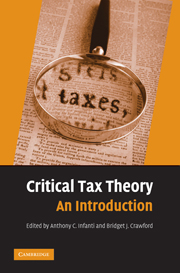Book contents
- Frontmatter
- Contents
- List of Illustrations
- List of Tables
- List of Contributors
- List of Common Abbreviations
- Introduction
- CHAPTER 1 FOUNDATIONS OF CRITICAL TAX THEORY
- CHAPTER 2 HISTORICAL PERSPECTIVES ON TAXATION
- CHAPTER 3 THE GOALS OF TAX POLICY
- CHAPTER 4 CRITICAL TAX THEORY MEETS PRACTICE
- CHAPTER 5 RACE AND TAXATION
- Tax Counts: Bringing Money-Law to LatCrit
- A Black Critique of the Internal Revenue Code
- The Marriage Bonus/Penalty in Black and White
- Tax and Race: The Impact on Asian Americans
- Race and Equality Across the Law School Curriculum: The Law of Tax Exemption
- Race and Class Matters in Tax Policy
- CHAPTER 6 GENDER AND TAXATION
- CHAPTER 7 SEXUAL ORIENTATION AND TAXATION
- CHAPTER 8 THE FAMILY AND TAXATION
- CHAPTER 9 CLASS AND TAXATION
- CHAPTER 10 DISABILITY AND TAXATION
- CHAPTER 11 GLOBAL CRITICAL PERSPECTIVES ON TAXATION
- CHAPTER 12 CRITICAL PERSPECTIVES ON CRITICAL TAX THEORY
- Index
Tax and Race: The Impact on Asian Americans
Published online by Cambridge University Press: 04 August 2010
- Frontmatter
- Contents
- List of Illustrations
- List of Tables
- List of Contributors
- List of Common Abbreviations
- Introduction
- CHAPTER 1 FOUNDATIONS OF CRITICAL TAX THEORY
- CHAPTER 2 HISTORICAL PERSPECTIVES ON TAXATION
- CHAPTER 3 THE GOALS OF TAX POLICY
- CHAPTER 4 CRITICAL TAX THEORY MEETS PRACTICE
- CHAPTER 5 RACE AND TAXATION
- Tax Counts: Bringing Money-Law to LatCrit
- A Black Critique of the Internal Revenue Code
- The Marriage Bonus/Penalty in Black and White
- Tax and Race: The Impact on Asian Americans
- Race and Equality Across the Law School Curriculum: The Law of Tax Exemption
- Race and Class Matters in Tax Policy
- CHAPTER 6 GENDER AND TAXATION
- CHAPTER 7 SEXUAL ORIENTATION AND TAXATION
- CHAPTER 8 THE FAMILY AND TAXATION
- CHAPTER 9 CLASS AND TAXATION
- CHAPTER 10 DISABILITY AND TAXATION
- CHAPTER 11 GLOBAL CRITICAL PERSPECTIVES ON TAXATION
- CHAPTER 12 CRITICAL PERSPECTIVES ON CRITICAL TAX THEORY
- Index
Summary
The literature on the effect of tax laws on minorities overwhelmingly looks at one minority group: blacks. In this context, “‘race’ means, quintessentially, African American,” a manifestation of what has been called the“black–white paradigm” or the “black–white binary.” Because race is such a complex issue, it is easier to identify the black experience as the minority experience. “The risk [of this narrow identification] is that non-black minority groups, not fitting into the dominant society's idea of race in America, become marginalized, invisible, foreign, un-American.” In the context of tax law, blacks appear the most negatively affected, especially within the context of their economic reality. In addition, given the de facto segregation of black and white lives, it is understandable that a system developed almost a hundred years ago by wealthy white men would benefit whites more than blacks. When tax and economics are so intermingled, Asian Americans appear too well off to be negatively impacted by the tax laws. Asian American households earn[ed] an average annual salary of §53,635 in 2001, compared to a white household's §46,305. But the empirical data may not always provide a complete picture into the economic situation of Asian Americans. When the data is examined a little closer, the factors that support a disparate impact on blacks could also support a disparate impact on Asian Americans.
In the mid-1800s, Asians began to immigrate in substantial numbers to the United States. Not long after that, taxes were used against them to subordinate and expel them. A study of Asian American history reveals a long legacy of racism from the white mainstream society.
- Type
- Chapter
- Information
- Critical Tax TheoryAn Introduction, pp. 130 - 136Publisher: Cambridge University PressPrint publication year: 2009
- 1
- Cited by



